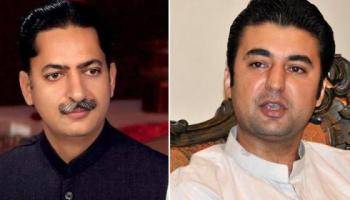Whatever else they may be, Pakistan’s politicians cannot be accused of being particularly enlightened. As if more proof of this were needed, earlier this week the PTI’s Murad Saeed and the PML-N’s Javed Latif were involved in a physical altercation outside the National Assembly after the latter levelled accusations of treason against Imran Khan and his supporters for speaking against holding the PSL final in Lahore last Sunday. It was simply the latest episode in what has been a long and inglorious history of Pakistan’s parliamentarians engaging in speech and conduct unbecoming of their position.
To be clear, some the criticism Imran Khan has received for his remarks on the PSL final is entirely deserved. In a few short sentences, the PTI Chairman managed to demonstrate both his narcissism and his racism, failing to rise above petty politics at a time of national celebration while simultaneously using the term ‘African’ in an incredibly derogatory way to question the talent of the foreign players who chose to come to Lahore. But, distasteful as these comments may have been, to suggest that raising questions about the PSL is treasonous is ludicrous, and simply demonstrates how the participants in our debased political discourse will stoop to any low and engage in any act of inane hyperbole in their attempts to score cheap political points.
That racism is not the preserve of any single political party can be seen by how stereotyping and persecuting entire groups of people based on their ethnic origin is something that the PML-N is more than willing to embrace as a pillar of public policy. Much of what Javed Latif had to say about Imran Khan was in response to statements from the PTI and the KPK government deploring the way in which Afghans and ethnic Pakthuns have been subjected to a dehumanising narrative that lays the blame for all terrorism and extremism in Pakistan at their feet. This view, more vigorously propagated since the attacks in Lahore and Sehwan Sharif, has been used to legitimize the forcible deportation of tens of thousands of Afghans, and the cultivation of a widespread atmosphere of distrust and suspicion in which innocent, law-abiding Pakhtun citizens have come to embody the alien, malevolent ‘Other’ responsible for Pakistan’s problems with violence and militancy. That this entire discourse is dangerously misleading and entirely incorrect should go without saying; terrorism is a multifaceted problem rooted in an array of different factors, and the organisations and individuals that perpetrate terror belong to a variety of ethnic, religious, and economic groups. To say otherwise is to fall into the trap of working with the same pointless binary logic that suggests, for example, that all Muslims are terrorists, and it boggles the mind that many who would rightly speak out against this characterisation of the Muslim world would, at the same time, find it possible to internalise and accept similar attacks on Pakhtuns.
By comparing Imran Khan to Mujib-ur-Rehman and Altaf Hussain, Javed Latif was engaging in the kind of ad hominem attack that is the usual refuge of the intellectually bankrupt. However, it is also important to recognise that this comparison, particularly with Mujib-ur-Rehman, is more telling than Latif probably realised; while he invokdemonstrate both his narcissism and his racism, failing to rise above petty politics at a time of national celebration while simultaneously using the term ‘African’ in an incredibly derogatory wayed Mujib-ur-Rehman as an example of someone who shattered Pakistan’s unity and brought about the break-up of the country, the fact is that the movement Mujib-ur-Rehman led was one that was borne out of the very real grievances of the people of East Pakistan and that ultimately, it was the intransigence of the West Pakistani establishment, and its refusal to concede any ground to its East Pakistani counterparts, that triggered the events of 1971. Pakistan has always been characterized by an inability to establish a balance between Punjab and the smaller provinces, and ethnic stereotyping of the kind currently being used against Pakhtuns is, in principle, no different from that which was directed against Bengalis a generation ago. By refusing to recognise this basic fact, the PML-N simply shows its inability to learn the lessons of history.
Javed Latif’s outlandish statements about Imran Khan were ultimately capped off by a press conference in which he, predictably enough, chose to attack Murad Saeed by casting aspersions on the character of his sisters. Again, this tiresome tactic is deeply ingrained in Pakistan’s patriarchal culture, and reflects the way in which the entire concept of ‘honour’ serves to regulate and control women while also objectifying them in a way that allows for attacks on them to be construed as attacks on the men in their families. Everyday, men in Pakistan will drone on endlessly about the ‘rights’ women enjoy in Pakistan, parroting a deeply sexist and paternalist discourse that suggests ‘protecting’ women – by confining them to their homes and limiting their contact with the outside world – is somehow good for them. The ideas underpinning this argument are not difficult to discern; female agency is dangerous, female choice must be eliminated, and women who defy patriarchal norms are legitimate targets for attack (because, of course, men cannot and should not be expected to control or regulated their own behavior).
By dragging Murad Saeed’s sisters into this entire affair, Javed Latif sought to engage in an act of symbolic emasculation, bringing Saeed’s honour and masculinity into question for his alleged failure to police the behaviour of the women in his household. All Javed Latif managed to show, however, is his own parochial pettiness; there is not much that needs to be said about a man who feels that it is ‘honourable’ to launch disgusting assaults on women who fail to conform to his own warped ideas about what is or is not acceptable conduct in society.






